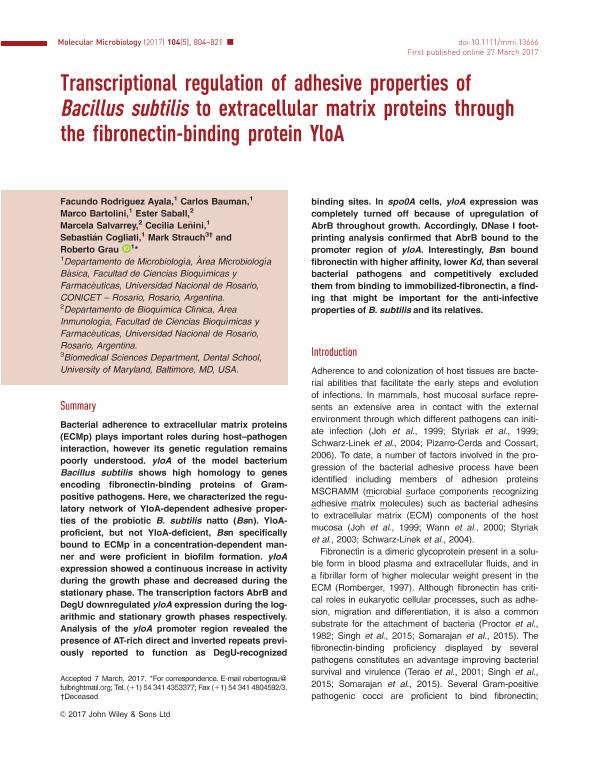Mostrar el registro sencillo del ítem
dc.contributor.author
Rodriguez Ayala, Facundo
dc.contributor.author
Bauman, Carlos
dc.contributor.author
Bartolini, Marco

dc.contributor.author
Saball, Digna Ester

dc.contributor.author
Salvarrey, Marcela Susana

dc.contributor.author
Leñini, Cecilia Andrea

dc.contributor.author
Cogliati, Sebastian Claudio

dc.contributor.author
Strauch, Mark
dc.contributor.author
Grau, Roberto Ricardo

dc.date.available
2019-05-02T18:37:51Z
dc.date.issued
2017-06
dc.identifier.citation
Rodriguez Ayala, Facundo; Bauman, Carlos; Bartolini, Marco; Saball, Digna Ester; Salvarrey, Marcela Susana; et al.; Transcriptional regulation of adhesive properties of Bacillus subtilis to extracellular matrix proteins through the fibronectin-binding protein YloA; Wiley Blackwell Publishing, Inc; Molecular Microbiology; 104; 5; 6-2017; 804-821
dc.identifier.issn
0950-382X
dc.identifier.uri
http://hdl.handle.net/11336/75431
dc.description.abstract
Bacterial adherence to extracellular matrix proteins (ECMp) plays important roles during host–pathogen interaction, however its genetic regulation remains poorly understood. yloA of the model bacterium Bacillus subtilis shows high homology to genes encoding fibronectin-binding proteins of Gram-positive pathogens. Here, we characterized the regulatory network of YloA-dependent adhesive properties of the probiotic B. subtilis natto (Bsn). YloA-proficient, but not YloA-deficient, Bsn specifically bound to ECMp in a concentration-dependent manner and were proficient in biofilm formation. yloA expression showed a continuous increase in activity during the growth phase and decreased during the stationary phase. The transcription factors AbrB and DegU downregulated yloA expression during the logarithmic and stationary growth phases respectively. Analysis of the yloA promoter region revealed the presence of AT-rich direct and inverted repeats previously reported to function as DegU-recognized binding sites. In spo0A cells, yloA expression was completely turned off because of upregulation of AbrB throughout growth. Accordingly, DNase I footprinting analysis confirmed that AbrB bound to the promoter region of yloA. Interestingly, Bsn bound fibronectin with higher affinity, lower Kd, than several bacterial pathogens and competitively excluded them from binding to immobilized-fibronectin, a finding that might be important for the anti-infective properties of B. subtilis and its relatives.
dc.format
application/pdf
dc.language.iso
eng
dc.publisher
Wiley Blackwell Publishing, Inc

dc.rights
info:eu-repo/semantics/openAccess
dc.rights.uri
https://creativecommons.org/licenses/by-nc-sa/2.5/ar/
dc.subject
Bacillus Subtilis
dc.subject
Probiotic
dc.subject
Yloa
dc.subject
Fibronectin Adherence
dc.subject.classification
Otras Ciencias Biológicas

dc.subject.classification
Ciencias Biológicas

dc.subject.classification
CIENCIAS NATURALES Y EXACTAS

dc.title
Transcriptional regulation of adhesive properties of Bacillus subtilis to extracellular matrix proteins through the fibronectin-binding protein YloA
dc.type
info:eu-repo/semantics/article
dc.type
info:ar-repo/semantics/artículo
dc.type
info:eu-repo/semantics/publishedVersion
dc.date.updated
2019-04-16T22:38:47Z
dc.identifier.eissn
1365-2958
dc.journal.volume
104
dc.journal.number
5
dc.journal.pagination
804-821
dc.journal.pais
Reino Unido

dc.journal.ciudad
Londres
dc.description.fil
Fil: Rodriguez Ayala, Facundo. Consejo Nacional de Investigaciones Científicas y Técnicas. Centro Científico Tecnológico Conicet - Rosario; Argentina. Universidad Nacional de Rosario. Facultad de Ciencias Bioquímicas y Farmacéuticas. Departamento de Microbiología; Argentina
dc.description.fil
Fil: Bauman, Carlos. Consejo Nacional de Investigaciones Científicas y Técnicas. Centro Científico Tecnológico Conicet - Rosario; Argentina. Universidad Nacional de Rosario. Facultad de Ciencias Bioquímicas y Farmacéuticas. Departamento de Microbiología; Argentina
dc.description.fil
Fil: Bartolini, Marco. Consejo Nacional de Investigaciones Científicas y Técnicas. Centro Científico Tecnológico Conicet - Rosario; Argentina. Universidad Nacional de Rosario. Facultad de Ciencias Bioquímicas y Farmacéuticas. Departamento de Microbiología; Argentina
dc.description.fil
Fil: Saball, Digna Ester. Universidad Nacional de Rosario. Facultad de Ciencias Bioquímicas y Farmacéuticas. Departamento de Microbiología; Argentina
dc.description.fil
Fil: Salvarrey, Marcela Susana. Universidad Nacional de Rosario. Facultad de Ciencias Bioquímicas y Farmacéuticas. Departamento de Microbiología; Argentina
dc.description.fil
Fil: Leñini, Cecilia Andrea. Consejo Nacional de Investigaciones Científicas y Técnicas. Centro Científico Tecnológico Conicet - Rosario; Argentina. Universidad Nacional de Rosario. Facultad de Ciencias Bioquímicas y Farmacéuticas. Departamento de Microbiología; Argentina
dc.description.fil
Fil: Cogliati, Sebastian Claudio. Consejo Nacional de Investigaciones Científicas y Técnicas. Centro Científico Tecnológico Conicet - Rosario; Argentina. Universidad Nacional de Rosario. Facultad de Ciencias Bioquímicas y Farmacéuticas. Departamento de Microbiología; Argentina
dc.description.fil
Fil: Strauch, Mark. University of Maryland; Estados Unidos
dc.description.fil
Fil: Grau, Roberto Ricardo. Consejo Nacional de Investigaciones Científicas y Técnicas. Centro Científico Tecnológico Conicet - Rosario; Argentina. Universidad Nacional de Rosario. Facultad de Ciencias Bioquímicas y Farmacéuticas. Departamento de Microbiología; Argentina
dc.journal.title
Molecular Microbiology

dc.relation.alternativeid
info:eu-repo/semantics/altIdentifier/url/https://onlinelibrary.wiley.com/doi/full/10.1111/mmi.13666
dc.relation.alternativeid
info:eu-repo/semantics/altIdentifier/doi/http://dx.doi.org/10.1111/mmi.13666
Archivos asociados
